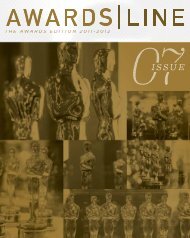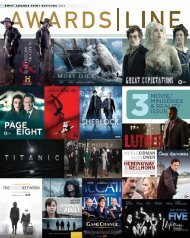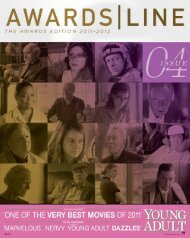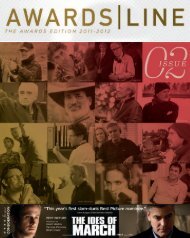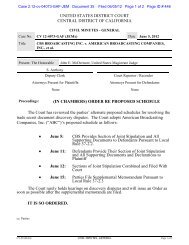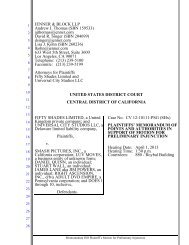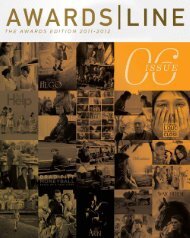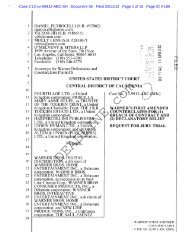the awards editions 2010-2011
the awards editions 2010-2011
the awards editions 2010-2011
Create successful ePaper yourself
Turn your PDF publications into a flip-book with our unique Google optimized e-Paper software.
i<br />
n a career now spanning more than 20 years, Peter Morgan has become one of <strong>the</strong> film<br />
industry’s most reliable writers, best known for crafting screenplays based on real–life<br />
people and events. In 2006 his original screenplay for The Queen was Oscar nominated,<br />
winning numerous o<strong>the</strong>r <strong>awards</strong> including a Golden Globe. The same year he<br />
won a BAFTA award for The Last King Of Scotland. Then he won an Oscar nod for<br />
adapting Frost/Nixon (2008) based on his own play. This year, he is writer and executive<br />
producer of his latest film Hereafter, directed by Clint Eastwood. A complete<br />
departure from his previous scripts, it’s a mult–character study telling three distinct<br />
stories about people affected by death or near death. It’s also <strong>the</strong> most personal of all<br />
Morgan’s work and something he wrote on spec not knowing if it would ever be made.<br />
DeaDline: What was your reaction when you saw <strong>the</strong> movie?<br />
peTeR moRgan: I spent most of <strong>the</strong> time when I watched for <strong>the</strong> first time loathing my<br />
work, wishing I had done more here or <strong>the</strong>re. And <strong>the</strong>n <strong>the</strong> second time, at <strong>the</strong> New York<br />
Film Festival, I really enjoyed it — not my work but <strong>the</strong> pace, of being allowed in. There are<br />
extremely honest things about it. I can assure<br />
you this is <strong>the</strong> most honest piece of writing I<br />
have ever done. I wrote it in a hut on a mountain<br />
for nobody because I wanted to. I don’t<br />
know, it just came to me.<br />
DeaDline: What drew you to this material?<br />
moRgan: The stuff that I have perhaps become<br />
known for that’s based on fact, and English<br />
statesmen shouting at each o<strong>the</strong>r all <strong>the</strong><br />
time, doesn’t entirely represent who I am. I am<br />
not a politics wonk. I like <strong>the</strong> idea of my writing<br />
reflecting more about who I am or o<strong>the</strong>r<br />
people. I wrote this not thinking for a minute<br />
that it would get made. I mean, <strong>the</strong> tsunami sequence<br />
— anyone in England would know if you<br />
write something like that, it’s just going to get<br />
taken out. You can’t afford anything like that. I<br />
wrote <strong>the</strong> first draft on my own in between assignments<br />
where I was being paid. I wasn’t paid<br />
to write this. I wrote it for myself and wrote it<br />
quite quickly and left it in a drawer.<br />
DeaDline: How did Clint Eastwood become<br />
involved in <strong>the</strong> film?<br />
moRgan: I sent it to my agent and he <strong>the</strong>n<br />
sent it to producer Kathleen Kennedy and she<br />
sent it to Steven Spielberg. He rang me up.<br />
Having a phone call from him was just a fantastic rite of passage. I loved it, and he was<br />
very focused, very likable, strictly business, and really sharp. The phone call lasted about<br />
three hours and I loved his ideas. I <strong>the</strong>n changed <strong>the</strong> script based on <strong>the</strong> notes he’d given<br />
me and was thrilled with it. I <strong>the</strong>n got a phone call saying, “Would you please come out<br />
to California as soon as possible.” So I jumped on a plane, went to <strong>the</strong> Universal lot for<br />
a meeting at 1 o’clock, went into <strong>the</strong> boardroom, an assistant came in and drew <strong>the</strong> curtains<br />
and said Mr. Spielberg has taken to having his meetings in <strong>the</strong> dark. She turned all<br />
<strong>the</strong> lights off, and <strong>the</strong>n she left and I thought, “Well, he’s really not here. It must be an<br />
imposter. But soon <strong>the</strong>re he was, and we had a really long lovely meeting in which he said<br />
<strong>the</strong> notes he had given me had harmed <strong>the</strong> script and I said, “No, it was good,” and he said,<br />
“No, no, it isn’t good and I damaged your work, and I don’t want to touch it again, and I<br />
want to go back to <strong>the</strong> original script that you sent me, and I want to give it to my friend<br />
16 deadline.com<br />
By Pete Hammond<br />
THE SURPRISING HEREAFTER<br />
PEtEr morgAN IS a maSteR oF manIPULatInG CHaRaCteRS,<br />
BUt not In tHIS SCReenPLay tHat manIPULated HIm<br />
Clint Eastwood.” Then I got this phone call saying Clint Eastwood wants to do it, and I<br />
said, “Wow, I can’t wait to start working.” But I not only didn’t have to do any rewrites, I<br />
wasn’t allowed to. I wondered why not since it was my material and I wanted to change it.<br />
But Clint said, “Don’t touch it. Don’t change it. I like it as it is. I want to make it as it is.”<br />
DeaDline: Was that reaction a surprise to you?<br />
moRgan: I’m not accustomed to that at all, I am accustomed to pain and self–destruction<br />
and draft after draft. On <strong>the</strong> one hand, you might think for a writer this was a<br />
dream come true. We finally came to this ra<strong>the</strong>r profound difference in our approaches.<br />
He likes <strong>the</strong> mess, <strong>the</strong> imperfection, <strong>the</strong> instinct. And it is full of bumpiness: it’s full of<br />
things that don’t quite add up or work that could be honed a bit more. But his view is<br />
<strong>the</strong> looseness and <strong>the</strong> imperfection allows an audience in. And it’s sort of <strong>the</strong> anti<strong>the</strong>sis<br />
of overworked controlled freakery that so much of <strong>the</strong> entertainment process is. There<br />
was something about <strong>the</strong> rawness of <strong>the</strong> first impulse that he wanted to preserve and<br />
protect. It’s a very different way of working than I’ve come across before.<br />
DeaDline: What kind of tone were you trying<br />
to achieve?<br />
moRgan: Writing this was in part an effort<br />
to help medicate <strong>the</strong> ever–present fear of death<br />
that you sort of live with. But it isn’t all about<br />
that. It feels to me like it’s a real correlation<br />
between grief and romance. And so somehow<br />
<strong>the</strong>re’s <strong>the</strong> blur between loneliness and grief in<br />
<strong>the</strong> story. The story needs to be harsh but it can<br />
be quite sweet or a sweet melancholy, and I think<br />
that was <strong>the</strong> tone I was after. I love how simple it<br />
is, and it’s not that emotionally manipulative.<br />
DeaDline: Do you feel <strong>the</strong> film was faithful<br />
to your script and were <strong>the</strong>re any scenes that<br />
weren’t shot?<br />
moRgan: No. I’ve never known anything like<br />
this before. For example, Clint told me <strong>the</strong> scenes<br />
with <strong>the</strong> Matt Damon character were shot in San<br />
Francisco. I originally wrote <strong>the</strong>m for Chicago.<br />
And Clint rang me up to say, “I hope you don’t<br />
mind, but we are going to actually change <strong>the</strong><br />
heading of <strong>the</strong> scene to say ‘San Francisco’ on <strong>the</strong><br />
script.” I said, “I think that’s very appropriate.”<br />
DeaDline: What is your motivation to write?<br />
moRgan: Sometimes you are lucky enough<br />
to get offered things and <strong>the</strong>re is no rhyme or reason. I am very lucky because I come from<br />
England and you have a whole range of things offered to you from television plays and shows<br />
and <strong>the</strong>atre so much more to explore, so it’s never really money. But it’s always what it is that<br />
interests you, although I’m not interested in Tony Blair so I don’t know why I keep writing<br />
about him. I am drawn to characters so full of internal contradictions. Idi Amin was one. I<br />
loved writing him.<br />
DeaDline: Do you want to direct?<br />
moRgan: The real beauty in my professional experience has been friendships and collaborations<br />
with filmmakers. I don’t want to direct. I have no directing ambition whatsoever. And<br />
as long as I meet filmmakers like Tom Hooper, Stephen Frears and o<strong>the</strong>rs who allow that collaboration,<br />
I can’t see why I would ever want to direct.



